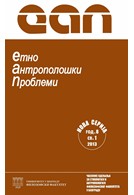Privlačnost motiva lutanja za – lutanjima nesklonog – Franca Šuberta
Wandering Motive and Its Appeal On Reluctantly Wandering Franz Schubert
Author(s): Dragana Jeremić MolnarSubject(s): Music, German Literature, Contemporary Philosophy, 19th Century, Sociology of Art
Published by: Филозофски факултет, Универзитет у Београду
Keywords: Schubert; Müller; Lied; wandering; romanticism;
Summary/Abstract: Franz Schubert was not generous in commenting his own creative procedures, or in revealing his artistic inspirations. Therefore, it is even today not clear why Wilhelm Müller’s collection of poems entitled Winter journey attracted Schubert so strongly that he was so determined to set it as a whole to the music. In this article the author mentions, and rejects as well, couple of commonly accepted interpretations. The path to the lieder cycle Winter journey was paved neither by Schubert’s identification with the main character – outcast overwhelmed by desperation and anticipation of the approaching death – and his strange ways of experiencing the world; neither by composer’s acceptance of impious beliefs hidden in Müller’s poems. The author argues that both poet and composer of Winter journey shared the affinity for the wandering (and wanderer) motive which was one of the central topics in the rising romantic Weltanschauung. Schubert was dealing with this motive from 1815 until his death mainly in his lieder, sometimes in very complex manner. In order to understand the real nature of Schubert’s artistic rapprochement to the motive of wandering, the author was obliged to consider and, at the first place, evaluate the works of scholars (such as Theodor Adorno, David Gramit, and Jeffrey Perry) who have been dealing with this problem. After that the author focuses her attention to the narrative entitled My dream, the most extensive and enigmatic writing left behind Schubert; she analyses the role of wandering in it, arguing that Schubert was participating in the spiritual currents of his time even unconsciously and trying to adapt them in order to serve as the solutions to his own existent ional dilemmas. Finally, she concludes that the composer was very sensitive for the complexity of the phenomena of wandering, when romantic Weltanschauung was at its peak, and eager to come to terms with this complexity artistically, paying the most attention to one of its layers – the regenerative one.
Journal: Етноантрополошки проблеми
- Issue Year: 8/2013
- Issue No: 1
- Page Range: 277-293
- Page Count: 17
- Language: Serbian

